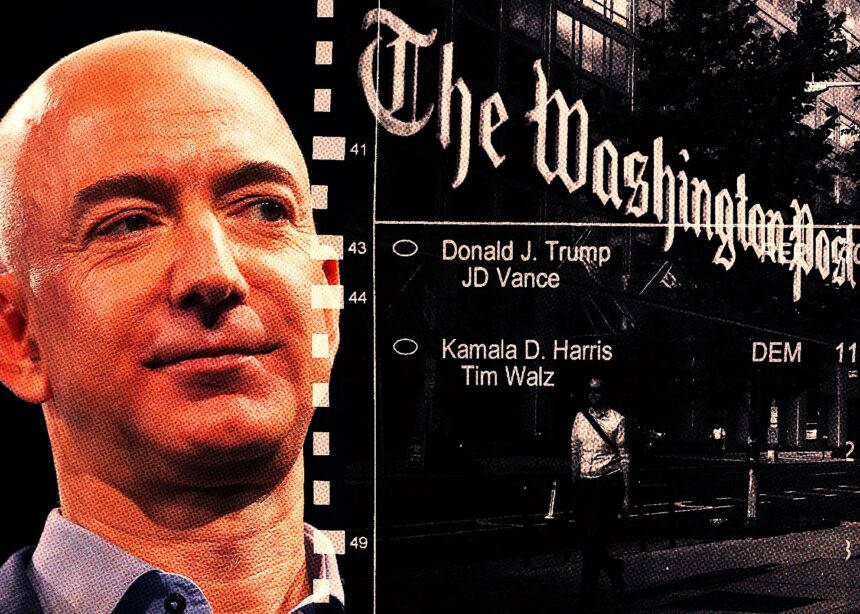Jeff Bezos, the billionaire owner of the Washington Post, is facing mounting criticism following a controversial decision made by the paper just before the 2024 presidential election. On a day when the Post’s editorial board was poised to endorse Kamala Harris, executives from his aerospace company, Blue Origin, met with Donald Trump. This has raised questions about the integrity of the Post and its editorial independence.
The Non-Endorsement Decision
In late September 2024, senior leaders at the Washington Post traveled to Miami for a meeting with Bezos, who expressed concerns about issuing an endorsement in the upcoming election. On October 25, the Post publicly announced that it would not endorse any candidate for the November 5 election, despite having already drafted an endorsement for Harris. This decision was met with outrage from within the newspaper, particularly since it was seen as a departure from the Post’s long-standing tradition of endorsing candidates during presidential elections.
Critics argue that the timing of the non-endorsement—coming just hours before Blue Origin executives met Trump—suggests a troubling connection between the media outlet and the former president. Trump’s campaign has consistently downplayed the legitimacy of mail-in voting, and the events of that day have fueled concerns about potential quid pro quo arrangements involving Bezos.
Washington Post editorial staff are in revolt after the paper reported that it wouldn't endorse a presidential candidate for the first time in 40 years and that its owner Jeff Bezos, Amazon's founder, made the decision.https://t.co/GU82Nzx5Vw pic.twitter.com/E7JHmjrXy9
— Paco Jariego / Who is L. M. Nolei? (@fjjariego) October 26, 2024Internal Reactions at the Post
The backlash within the Post has been significant. Robert Kagan, a prominent columnist and editor-at-large, resigned in protest over the non-endorsement, stating that such a meeting would not have occurred had the paper endorsed Harris as planned. Kagan voiced concerns that the decision indicated a troubling compromise of journalistic integrity, suggesting that Bezos’s influence may have led to a “deal” with Trump.
The Post’s publisher, Will Lewis, defended Bezos, stating that the decision was ultimately his. However, this defense has done little to quell the criticism. Eighteen opinion columnists signed a dissenting letter denouncing the decision, labeling it a “terrible mistake” for the paper and its readers. Former employees and notable figures, including journalist Carl Bernstein and author Stephen King, have also expressed their disappointment, with many choosing to cancel their subscriptions in protest.
The Broader Implications
The Washington Post is not alone in facing backlash for its editorial decisions. The Los Angeles Times experienced a similar situation, with its editorial board barred from endorsing Harris. Observers have drawn parallels between these incidents, suggesting they reflect a broader trend of media outlets curtailing their editorial freedom in anticipation of a possible second Trump presidency.
Critics have described this trend as “anticipatory obedience,” a term coined by historian Tim Snyder to denote the preemptive surrender of journalistic integrity in the face of authoritarianism. Such concerns are underscored by the alarming political climate in which Trump has repeatedly threatened to retaliate against those who oppose him.
The Role of Media in Democracy
The Washington Post has historically positioned itself as a defender of democracy, coining the phrase “democracy dies in darkness” in response to rising authoritarianism. The non-endorsement decision has raised questions about whether the paper is living up to its own standards. Former executive editor Marty Baron condemned the move as “cowardice,” asserting that it invites further intimidation from Trump and undermines the principles of free press.
This debate highlights the precarious role of media in today’s political landscape. In a time when misinformation and distrust in media are rampant, the choices made by influential newspapers carry significant weight. The Post’s decision not to endorse a candidate has been perceived by many as a retreat from its journalistic responsibilities, further fueling fears about the erosion of democratic norms.
The Future of Electoral Integrity
As the 2024 election approaches, the phenomenon known as the “red mirage” or “blue shift” has become a focal point of discussion. This refers to the early lead that Republican candidates often appear to have on election night, which can be overturned by the later counting of mail-in ballots—typically cast by Democratic voters. In 2020, many states saw dramatic shifts in vote totals as mail-in ballots were processed in the days following the election.
While the Washington Post’s non-endorsement decision may not directly influence the election’s outcome, it reflects the anxieties and uncertainties surrounding electoral integrity. States have begun implementing laws aimed at speeding up the counting process, but close elections could still lead to delays in finalizing results, potentially stoking further political tensions.
Conclusion: A Call for Journalistic Integrity
As the Washington Post navigates this turbulent period, the question remains: Can it reclaim its legacy as a champion of democracy in the face of external pressures? The backlash from employees, readers, and former journalists indicates a strong desire for the paper to uphold its commitment to editorial independence.
The intersection of media and politics is fraught with challenges, but the Post has a responsibility to its readers to provide clear, unbiased coverage of the electoral process. The choices made in the coming weeks will not only impact the paper’s reputation but also influence the broader conversation about the role of journalism in safeguarding democracy. In a world where every decision counts, it’s crucial for the Post to reaffirm its commitment to the principles that have defined its legacy.
Read More : Trump’s Daring Revelations Spark Outrage on Joe Rogan Podcast






